Tag: British history
Primary Sources: British Labour Party papers, 1906-1969
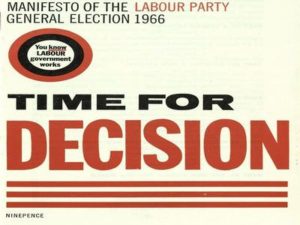 The Library has acquired British Labour Party papers, 1906-1969, a module on the British Online Archives platform.
The Library has acquired British Labour Party papers, 1906-1969, a module on the British Online Archives platform.
These papers cover the foundation of the Parliamentary Labour Party in 1906, then “follow the Party through Ramsay MacDonald’s Governments, two world wars, the first Harold Wilson Government and the early part of his second Government. The events in these records are a reflection of current events as much as of the Party itself. From the suffrage campaign for the electoral enfranchisement of women, to nuclear tests over the Pacific Ocean, through the Beveridge Report, the Trade Union Bill and the development of the United Nations. Early policies like the minimum wage would not pass for decades and Party discipline would be a challenge for every Party Leader. Those challenges existed alongside the removal of the right for employers to sue trade unions and the creation of social services. These papers have been arranged by year and divided into thematic groups for ease of analysis.”
Trial: John Johnson Collection: An Archive of Printed Ephemera
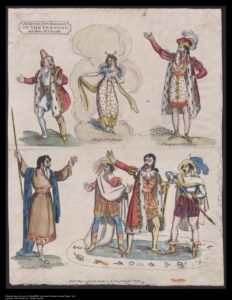 Until April 1, the Library has trial access to the John Johnson Collection, An Archive of Printed Ephemera. This resource provides high-quality images of thousands of items selected from the John Johnson Collection of Printed Ephemera housed at the Bodleian Library in Oxford, England. The collection offers “unique insights into the changing nature of everyday life in Britain in the eighteenth, nineteenth, and twentieth centuries. Categories include Nineteenth-Century Entertainment, the Booktrade, Popular Prints, Crimes, Murders and Executions, and Advertising.”
Until April 1, the Library has trial access to the John Johnson Collection, An Archive of Printed Ephemera. This resource provides high-quality images of thousands of items selected from the John Johnson Collection of Printed Ephemera housed at the Bodleian Library in Oxford, England. The collection offers “unique insights into the changing nature of everyday life in Britain in the eighteenth, nineteenth, and twentieth centuries. Categories include Nineteenth-Century Entertainment, the Booktrade, Popular Prints, Crimes, Murders and Executions, and Advertising.”
Trial: Newspapers and Associated Press collections
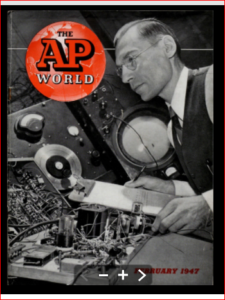 Until October 20, 2017, the Library has trial access to the following resources:
Until October 20, 2017, the Library has trial access to the following resources:
Associated Press Collections including,
Associated Press: European Bureaus Collection
Associated Press: Middle Eastern Bureaus Collection
Associated Press: News Features & Internal Communications
Associated Press: US City Bureaus Collection
Associated Press: Washington Bureau II Collection
Associated Press: Washington/D.C. Bureau Collection
Daily Mail Historical Archive
International Herald Tribune
The Telegraph Historical Archive, 1855-2000
Your feedback on the usefulness of these is greatly appreciated.
Trial: Colonial America, with handwritten text recognition
Adam Matthew Digital (AMD) has completed three of five modules of Colonial America, an online resource that will include all 1,450 volumes of the CO 5 series from The National Archives, UK, covering the period 1606 to 1822. The Library currently has trial access to the three modules until October 16, 2017.
It is with the third module of Colonial America that AMD has implemented a technology that allows for full text searching of handwritten documents. The Handwritten Text Recognition (HTR) application uses algorithms and artificial intelligence to determine possible combinations of characters in manuscripts.
The default search will search both metadata applied to documents and their text. When results are found in the text, they are displayed as snippets.
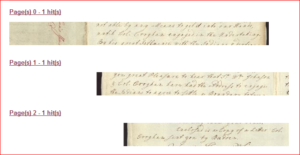
Clicking on a hit will take you to the page where the word appears.
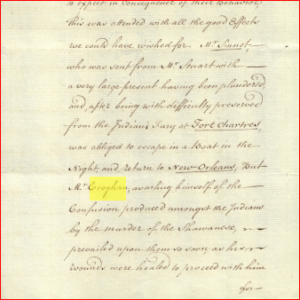
This search function is ground-breaking, but not 100% accurate. I’ve searched for words that exist in a document and have retrieved no results. I have also searched for words that were written sloppily or with a long s and have retrieved results.
I am interested in your feedback on both the value of the database and your successes (or failures) with full-text searches. Email me at dorner@berkeley.edu.
(Please note that PDF downloads are not available during the trial.)
Freedom to Marry Oral History Project
The Freedom to Marry Oral History Project
In the historically swift span of roughly twenty years, support for the freedom to marry for same-sex couples went from an idea a small portion of Americans agreed with to a cause supported by virtually all segments of the population. In 1996, when Gallup conducted its first poll on the question, a seemingly insurmountable 68% of Americans opposed the extension of marriage rights. In a historic reversal, fewer than twenty years later several polls found that over 60% of Americans had come to support the freedom to marry nationwide. The rapid increase in support mirrored the progress in securing the right to marry coast to coast. Before 2004, no state issued marriage licenses to same-sex couples. By spring 2015, thirty-seven states affirmed the freedom to marry for same-sex couples, with a number of states extending marriage through votes in state legislatures or at the ballot box. The discriminatory federal Defense of Marriage Act, passed in 1996, denied legally married same-sex couples the federal protections and responsibilities afforded married different-sex couples—a double-standard corrected when a core portion of the act was overturned by the U.S. Supreme Court in 2013 in United States v. Windsor. The full national resolution came in June 2015 when, in Obergefell v. Hodges, the U.S. Supreme Court ruled that the Constitution’s guarantee of the fundamental right to marry applies equally to same-sex couples.
The Oral History Center is thrilled to release to the public the first major oral history project documenting the vast shift in public opinion about marriage, the consequential reconsideration of our nation’s laws governing marriage, and the actions of individuals and organizations largely responsible for these changes. The Freedom to Marry Oral History Project produced 23 interviews totaling nearly 100 hours of recordings. Interviewees include: Evan Wolfson, founder of Freedom to Marry; Kate Kendell, executive director of the National Center for Lesbian Rights; James Esseks, director of the ACLU’s LGBT & HIV project; and Thalia Zepatos, the movement’s “message guru” who worked at Freedom to Marry as director of research and messaging. Read on for video clips of the interviews and links to complete interview transcripts.
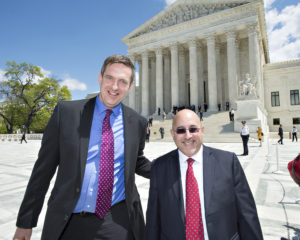
At the center of the effort to change hearts and minds, prevail in the courts and legislatures, win at the ballot, and win at the Supreme Court was Freedom to Marry, the national campaign launched by Harvard-trained attorney Evan Wolfson in 2003. Freedom to Marry’s national strategy focused from the beginning on setting the stage for a nationwide victory at the Supreme Court. Working with national and state organizations and allied individuals and organizations, Freedom to Marry succeeded in building a critical mass of states where same-sex couples could marry and a critical mass of public support in favor of the freedom to marry. This oral history project focuses on the pivotal role played by Freedom to Marry and their closest state and national organizational partners, as they drove the winning strategy and inspired, grew, and leveraged the work of a multitudinous movement.
Freedom to Marry Oral History Project Interview Transcripts:
Barbara Cox, “Barbara Cox on Marriage Law and the Governance of Freedom to Marry.”
Michael Crawford, “Michael Crawford on the Digital Campaign at Freedom to Marry.”
Scott Davenport, “Scott Davenport on Administration and Operations at Freedom to Marry.”
Jo Deutsch, “Jo Deutsch and the Federal Campaign.”
Sean Eldridge, “Sean Eldridge on Politics, Communications, and the Freedom to Marry.”
James Esseks, “James Esseks on the Legal Strategy, the ACLU, and LGBT Legal Organizations.”
Harry Knox, “Harry Knox on the Early Years of Freedom to Marry.”
Matt McTighe, “Matt McTighe on the Marriage Campaigns in Massachusetts and Maine.”
Amy Mello, “Amy Mello and Field Organizing in Freedom to Marry.” (forthcoming)
John Newsome, “John Newsome on And Marriage for All.”
Kevin Nix, “Kevin Nix on Media and Public Relations in the Freedom to Marry Movement.”
Bill Smith, “Bill Smith on Political Operations in the Fight to Win the Freedom to Marry.”
Marc Solomon, “Marc Solomon on Politics and Political Organizing in the Freedom to Marry Movement.” (forthcoming)
Tim Sweeney, “Tim Sweeney on Foundations and the Freedom to Marry Movement.”
Cameron Tolle, “Cameron Tolle on the Digital Campaign at Freedom to Marry.”
Thomas Wheatley, “Thomas Wheatley on Field Organizing with Freedom to Marry.”
Evan Wolfson, “Evan Wolfson on the Leadership of the Freedom to Marry Movement.”
Thalia Zepatos, “Thalia Zepatos on Research and Messaging in Freedom to Marry.”

Primary Sources: Confidential Print: North America, 1824-1961
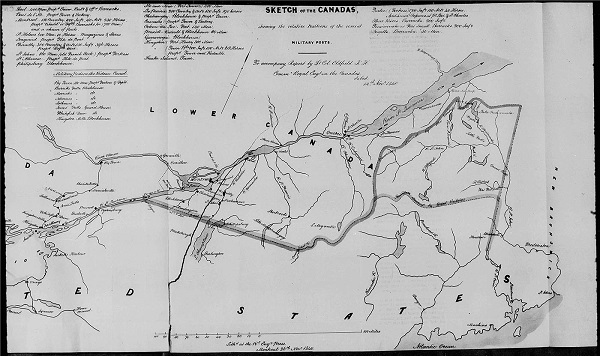
Beginning in the 1820s, the Confidential Print series was a selection of key correspondence, orders, policy documents, treaty texts, and memoranda from Great Britain’s Foreign Office and Colonial Office distributed internally to the Monarchy, Cabinet, members of Parliament, and within their organizations. Confidential Print: North America sheds light on controversies surrounding slavery, the treatment of Canadian indigenous peoples, uprisings against colonial rule, labor unrest in the United states, Nazi and fascist activities in Latin America, and much more. The record groups included in this series of Confidential Print are:
CO 880 War and Colonial Department and Colonial Office: Confidential Print North America, 1939-1914
CO 884 War and Colonial Department and Colonial Office: West Indies, Confidential Print 1826-1961
FO 414 Foreign Office: Confidential Print North America, 1824-1941
FO 461 Foreign Office: Confidential Print America, 1942-1956
FO 462 Foreign Office: Confidential Print United States of America, 1947-1956
More details about the contents of these record groups can be found in the Nature & Scope page of the site.
Primary Sources: Foreign Office Files for the Middle East (updated)
The Library now has all three modules of the online resource Foreign Office Files for the Middle East, which include 1971-1974: The 1973 Arab-Israeli War and the Oil Crisis; 1975-1978: The Lebanese Civil War and the Camp David Accords; and 1979-1981: The Iranian Revolution and the Iran-Iraq War.
The content is sourced from the British Government records at the UK National Archives. The following Foreign and Commonwealth Office file classes are included in their entirety:
CO 935/1-25 Middle East General, 1920-1956
FO 402/1-33 Afghanistan, 1922-1957
FO 406/1-84 Eastern Affairs (Middle East), 1812-1946
FO 407/1-237 Egypt/Sudan, 1839-1958
FO 416/1-113 Persia, 1899-1957
FO 423/1-70 Suez Canal, 1859-1947
FO 424/1-297 Turkey, 1841-1957
FO 437/1-9 Jordan, 1949-1957
FO 464/1-12 Arabia, 1947-1957
FO 481/1-17 Iraq, 1947-1969
FO 484/1-11 Lebanon, 1947-1957
FO 487/1-11 Middle East General, 1947-1957
FO 492/1-11 Israel/Palestine, 1947-1957
FO 501/1-10 Syria, 1947-1956
Selections from the Prime Minister’s Office files (PREM) and Defence Intelligence files (DEFE) are also included.
Primary Sources: British Poor Schools in the Nineteenth Century, 1812-1901
Recently added to our collection of British Online Archives are the reports of British Poor Schools in the Nineteenth Century, 1812-1901. The compiled reports were printed and then microfilmed — this resource is a digitized version of the microfilm.
These reports cover the history of poor schools and the societies that ran them in Britain, including schools from the Anglican and Wesleyan denominations as well as secular and Catholic schools, and chart the rise of education for the poor from the industrial revolution to the Victorian era.
Webinar: East India Company database
Adam Matthew has put together a webinar on the East India Company resource.
Guest Speakers include:
Dr Kate Boehme, University of Sussex – 18:00
Penny Brook, Head of the India Office Records, The British Library – 31:08
Primary Sources: Caribbean Blue Books, 1824-1950
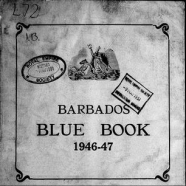 Recently added to our collection of British Online Archives are the Caribbean Blue Books, 1824-1950, statistical records for the colonies of Antigua, the Bahamas, Barbados, Bermuda, British Honduras, Dominica, Jamaica, Montserrat, St Christopher, Nevis, St Lucia, St. Vincent, Tortola, the Turks Islands, the British Virgin Islands, Trinidad and Tobago. The records include the years 1839-1938, though some begin in 1824 and others continue to 1950.
Recently added to our collection of British Online Archives are the Caribbean Blue Books, 1824-1950, statistical records for the colonies of Antigua, the Bahamas, Barbados, Bermuda, British Honduras, Dominica, Jamaica, Montserrat, St Christopher, Nevis, St Lucia, St. Vincent, Tortola, the Turks Islands, the British Virgin Islands, Trinidad and Tobago. The records include the years 1839-1938, though some begin in 1824 and others continue to 1950.
The Blue Books include population numbers, education reports, grants of land, imports and exports, and prison statistics.